Continuing our spotlighting of books by authors taking part in Children’s Literature Day, a full day of programming dedicated to children’s and young adult literature at the ILA 2018 Conference in Austin, Texas, on 23, this week’s column features reviews of books by authors participating in the Portrayals of Latinx Families in Children’s Literature panel and the Putting Books to Work Early Young Adult and Older Young Adult sessions.
Portrayals of Latinx Families in Children’s Literature
Alma and How She Got Her Name. Juana Martinez-Neal. 2018. Candlewick.
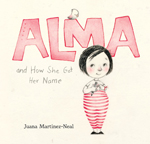 Alma is a small girl with a big name: Alma Sofia Esperanza José Pura Candela. When Alma shows her father how she has to tape an extra strip of paper to fit her name on a page, he says, “Let me tell you the story of your name. Then you decide if it fits.” He shows her photos from a family album and tells her about each of the relatives for whom she is named. Alma loves the stories, but wants to know about Alma. His reply: “You are the first and the only Alma. You will make your own story.” The illustrations, featuring a charming Alma, were done as print transfers with graphite and colored pencils. In “A Note from Juana,” Martinez-Neal, who was born in Peru and now lives in the U. S., tells about her long name and invites readers to explore the story of their names.
Alma is a small girl with a big name: Alma Sofia Esperanza José Pura Candela. When Alma shows her father how she has to tape an extra strip of paper to fit her name on a page, he says, “Let me tell you the story of your name. Then you decide if it fits.” He shows her photos from a family album and tells her about each of the relatives for whom she is named. Alma loves the stories, but wants to know about Alma. His reply: “You are the first and the only Alma. You will make your own story.” The illustrations, featuring a charming Alma, were done as print transfers with graphite and colored pencils. In “A Note from Juana,” Martinez-Neal, who was born in Peru and now lives in the U. S., tells about her long name and invites readers to explore the story of their names.
—CA
Marcus Vega Doesn’t Speak Spanish. Pablo Cartaya. 2018. Viking/Penguin.
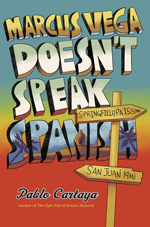 At six feet tall, 14-year-old Marcus Vega is unfairly pegged as a dangerous bully and faces suspension from school after defending his younger brother, Charlie, who has Down syndrome. His struggling single mother decides to regroup and use her airline family travel benefits to take them to visit her former husband’s family in Puerto Rico, where Marcus was born. Marcus spends five days meeting relatives he didn’t know he had, trying to learn Spanish, and searching for the father who abandoned them. After seeing his estranged father for the first time in 10 years, Marcus lets go of his dream of a “happily ever after” reunited family, but upon returning to school, his life unexpectedly takes a turn for the better. In a relatable style, with interspersed Spanish, readers will find themselves drawn into Marcus’ world.
At six feet tall, 14-year-old Marcus Vega is unfairly pegged as a dangerous bully and faces suspension from school after defending his younger brother, Charlie, who has Down syndrome. His struggling single mother decides to regroup and use her airline family travel benefits to take them to visit her former husband’s family in Puerto Rico, where Marcus was born. Marcus spends five days meeting relatives he didn’t know he had, trying to learn Spanish, and searching for the father who abandoned them. After seeing his estranged father for the first time in 10 years, Marcus lets go of his dream of a “happily ever after” reunited family, but upon returning to school, his life unexpectedly takes a turn for the better. In a relatable style, with interspersed Spanish, readers will find themselves drawn into Marcus’ world.
—NB
Me, Frida, and the Secret of the Peacock Ring. Angela Cervantes. 2018. Scholastic.
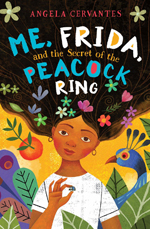 Although 11-year-old Paloma is unhappy about accompanying her mother, Professor Emma Marquez, on her summer fellowship to Mexico (the birthplace of Paloma’s father, who died when she was young), she hopes to add something new to her “memory box” during the trip. Local kids Gael, her Spanish tutor, and his twin sister, Lizzie, ask Paloma for help solving the mystery of Frida Kahlo’s missing peacock ring, supposedly hidden in a locked room in La Casa Azul (Frida Kahlo’s home that is now a museum) after her death in 1954. Inspired by her favorite fictional sleuth, Lulu Pennywhistle, Paloma is quickly immersed in intrigue, not sure of whom to trust, and learns that it takes courage to uncover the truth. An author’s note describes how Cervantes has blended truth and fiction to create this fascinating mystery.
Although 11-year-old Paloma is unhappy about accompanying her mother, Professor Emma Marquez, on her summer fellowship to Mexico (the birthplace of Paloma’s father, who died when she was young), she hopes to add something new to her “memory box” during the trip. Local kids Gael, her Spanish tutor, and his twin sister, Lizzie, ask Paloma for help solving the mystery of Frida Kahlo’s missing peacock ring, supposedly hidden in a locked room in La Casa Azul (Frida Kahlo’s home that is now a museum) after her death in 1954. Inspired by her favorite fictional sleuth, Lulu Pennywhistle, Paloma is quickly immersed in intrigue, not sure of whom to trust, and learns that it takes courage to uncover the truth. An author’s note describes how Cervantes has blended truth and fiction to create this fascinating mystery.
—NB
Stella Díaz Has Something to Say. Angela Dominguez. 2018. Roaring Brook.
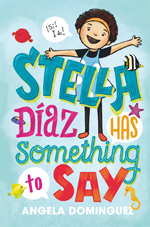 Painfully shy third grader Stella Díaz (who lives with her divorced mother and older brother, Nick) feels torn between two cultures and two languages, English and Spanish. Her best friend, Jenny, is with another teacher this year, and lonely Stella yearns for a special classroom buddy. When Stanley Mason joins the class, Stella thinks he might be that new friend—if only she can get up the nerve to speak to him. Dreading an upcoming presentation on her favorite topic, marine animals, and frozen with fear, Stella gets help from her brother in preparing for the big day. Spanish vocabulary, woven into the text, and childlike black-and-white illustrations complement this true story of a young girl reaching deep inside to find her voice because, indeed, Stella Díaz has something important to say. An author’s note describes Dominguez’s inspiration for the story.
Painfully shy third grader Stella Díaz (who lives with her divorced mother and older brother, Nick) feels torn between two cultures and two languages, English and Spanish. Her best friend, Jenny, is with another teacher this year, and lonely Stella yearns for a special classroom buddy. When Stanley Mason joins the class, Stella thinks he might be that new friend—if only she can get up the nerve to speak to him. Dreading an upcoming presentation on her favorite topic, marine animals, and frozen with fear, Stella gets help from her brother in preparing for the big day. Spanish vocabulary, woven into the text, and childlike black-and-white illustrations complement this true story of a young girl reaching deep inside to find her voice because, indeed, Stella Díaz has something important to say. An author’s note describes Dominguez’s inspiration for the story.
—NB
Putting Books to Work: Early Young Adult (Ages 12-14)
Fault Lines in the Constitution: The Framers, Their Fights and the Flaws That Affect Us Today. Cynthia Levinson & Sanford Levinson. 2017. Peachtree.
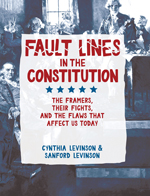 The Levinsons thoughtfully explore the U.S. Constitution, examining the Framers’ “fights” during the Constitutional Convention in 1787 and the Constitution’s “flaws” that have affected our country throughout its history. The narrative, supplemented by interesting infographics, considers provisions of the Constitution, resulting “big problems,” and connections to present-day issues. The authors end by grading the Constitution in terms of its successes and problems based on goals set out in the Preamble—and give it an overall C+. Readers can continue to explore current political issues related to the Constitution on the Levinsons’ Fault Lines at faultlinesintheconstitution.com.
The Levinsons thoughtfully explore the U.S. Constitution, examining the Framers’ “fights” during the Constitutional Convention in 1787 and the Constitution’s “flaws” that have affected our country throughout its history. The narrative, supplemented by interesting infographics, considers provisions of the Constitution, resulting “big problems,” and connections to present-day issues. The authors end by grading the Constitution in terms of its successes and problems based on goals set out in the Preamble—and give it an overall C+. Readers can continue to explore current political issues related to the Constitution on the Levinsons’ Fault Lines at faultlinesintheconstitution.com.
—CA
Ghost Boys. Jewell Parker Rhodes. 2018. Little, Brown.
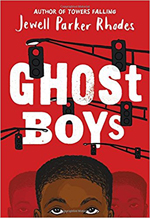 While playing with a toy gun, 12-year-old Jerome is fatally shot by a white policeman. Returning as a ghost, Jerome observes the effects of his tragic death on his family, Sarah (the policeman’s daughter), and Carlos (the friend who gave him the toy gun to fend off bullies) and discovers that he is surrounded by other ghost boys who were killed in violent circumstances. Told in sections that alternate between pre- and post-death, this insightful story takes readers through the shooting to the preliminary hearing in the Chicago Courthouse and the verdict. Back matter includes an afterword, questions for extending classroom discussion, and resources.
While playing with a toy gun, 12-year-old Jerome is fatally shot by a white policeman. Returning as a ghost, Jerome observes the effects of his tragic death on his family, Sarah (the policeman’s daughter), and Carlos (the friend who gave him the toy gun to fend off bullies) and discovers that he is surrounded by other ghost boys who were killed in violent circumstances. Told in sections that alternate between pre- and post-death, this insightful story takes readers through the shooting to the preliminary hearing in the Chicago Courthouse and the verdict. Back matter includes an afterword, questions for extending classroom discussion, and resources.
—NB
House of Purple Cedar. Tin Tingle. 2014. Cinco Puntos.
 Master storyteller Tingle’s historical novel is told through the eyes of Rose, a Choctaw woman who grew up in Indian Territory (now Oklahoma) in the town of Skullyville, among the Nahullos (whites). She recounts her life story, starting with the 1896 burning of the New Hope Academy for Girls, a boarding school where she is a student, and continues with other racial, often violent, incidents that everyone in the Choctaw community, including the beating of her grandfather, Amafo, at the hands of the racist white sheriff. Rose witnesses her grandfather’s decision to respond with forgiveness rather than violence. The story is filled with spiritualism, mystical connections to nature, family, and religion. Readers will experience a gripping description of the Choctaw culture and community.
Master storyteller Tingle’s historical novel is told through the eyes of Rose, a Choctaw woman who grew up in Indian Territory (now Oklahoma) in the town of Skullyville, among the Nahullos (whites). She recounts her life story, starting with the 1896 burning of the New Hope Academy for Girls, a boarding school where she is a student, and continues with other racial, often violent, incidents that everyone in the Choctaw community, including the beating of her grandfather, Amafo, at the hands of the racist white sheriff. Rose witnesses her grandfather’s decision to respond with forgiveness rather than violence. The story is filled with spiritualism, mystical connections to nature, family, and religion. Readers will experience a gripping description of the Choctaw culture and community.
—SK
Putting Books to Work: Older Young Adult (Ages 14+)
Boots on the Ground: America’s War in Vietnam. Elizabeth Partridge. 2018. Viking/Penguin.
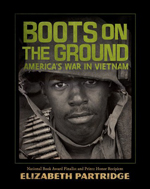 Elizabeth Partridge’s dramatic narrative history of the United States’ involvement in the Vietnam War focuses on the personal stories of eight people—five men who fought on the ground, a medic, a field nurse, and a refugee. Accounts of their experiences in Vietnam are arranged chronologically and interspersed with chapters profiling the roles of four presidents— John F. Kennedy, Lyndon B. Johnson, Richard M. Nixon, and Gerald R. Ford—and other key figures involved in the political and social controversy over the war in the U.S. The abundance of captioned archival photographs and quotes throughout the narrative and notes on what became of the eight interviewees after the U.S. withdrew from Vietnam in 1975 express the effects of the war. Back matter includes source notes, an extensive bibliography, and an index.
Elizabeth Partridge’s dramatic narrative history of the United States’ involvement in the Vietnam War focuses on the personal stories of eight people—five men who fought on the ground, a medic, a field nurse, and a refugee. Accounts of their experiences in Vietnam are arranged chronologically and interspersed with chapters profiling the roles of four presidents— John F. Kennedy, Lyndon B. Johnson, Richard M. Nixon, and Gerald R. Ford—and other key figures involved in the political and social controversy over the war in the U.S. The abundance of captioned archival photographs and quotes throughout the narrative and notes on what became of the eight interviewees after the U.S. withdrew from Vietnam in 1975 express the effects of the war. Back matter includes source notes, an extensive bibliography, and an index.
—CA
Hope Nation: YA Authors Share Personal Moments of Inspiration. Rose Brock (Ed.). 2018. Philomel/Penguin.
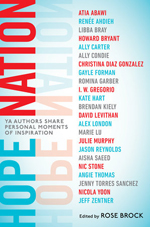 In this inspiring collection, the word “hope” is the thread that binds these leading voices of young adult literature, including David Levithan, Jason Reynolds, Angie Thomas, Libba Bray, and many more. Their writings express fear, disappointment, pain, and injustice, but end with hope. The selections give voice to the confusion that young people (and really everyone) may experience in the complicated and oftentimes disappointing world in which we live. With an inspiring collective message, “Hope is a decision,” these essays were written for teenagers but will resonate with all readers.
In this inspiring collection, the word “hope” is the thread that binds these leading voices of young adult literature, including David Levithan, Jason Reynolds, Angie Thomas, Libba Bray, and many more. Their writings express fear, disappointment, pain, and injustice, but end with hope. The selections give voice to the confusion that young people (and really everyone) may experience in the complicated and oftentimes disappointing world in which we live. With an inspiring collective message, “Hope is a decision,” these essays were written for teenagers but will resonate with all readers.
—SK
Shame the Stars. Guadalupe García McCall. 2016. Tu/Lee & Low.
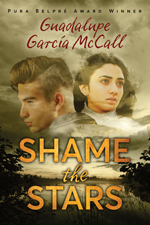 In this Romeo and Juliet story set in 1915 Texas, 18-year-olds Joaquin del Toro (a poet set to inherit his father’s rancho) and Dulceña Villa (who writes incendiary articles for her father’s newspaper under a pen name) have been in love since they were children. With escalating violence among Texas rangers who act as vigilantes, ranchers who want justice, and Tejano rebels set on reclaiming Texas for Mexico, the teens’ families end up on opposite sides of the conflict, and Joaquin and Dulceña pursue their clandestine relationship with dangerous consequences for their families. Back matter includes an author’s note, resources, and a glossary. McCall’s next book to bring little known history to life, All the Stars Denied,will be released in September.
In this Romeo and Juliet story set in 1915 Texas, 18-year-olds Joaquin del Toro (a poet set to inherit his father’s rancho) and Dulceña Villa (who writes incendiary articles for her father’s newspaper under a pen name) have been in love since they were children. With escalating violence among Texas rangers who act as vigilantes, ranchers who want justice, and Tejano rebels set on reclaiming Texas for Mexico, the teens’ families end up on opposite sides of the conflict, and Joaquin and Dulceña pursue their clandestine relationship with dangerous consequences for their families. Back matter includes an author’s note, resources, and a glossary. McCall’s next book to bring little known history to life, All the Stars Denied,will be released in September.
—NB
Carolyn Angus is former director of the George G. Stone Center for Children's Books, Claremont Graduate University, in Claremont, California. Nancy Brashear is Professor Emeritus of English from Azusa Pacific University, in Azusa, California. Susan Knell is a professor in the department of Teaching and Leadership at Pittsburg State University in Pittsburg, Kansas, where she teaches literacy and literature courses at the undergraduate and graduate level.